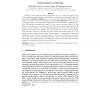Free Online Productivity Tools
i2Speak
i2Symbol
i2OCR
iTex2Img
iWeb2Print
iWeb2Shot
i2Type
iPdf2Split
iPdf2Merge
i2Bopomofo
i2Arabic
i2Style
i2Image
i2PDF
iLatex2Rtf
Sci2ools
101
click to vote
ECCV
2002
Springer
2002
Springer
Hyperdynamics Importance Sampling
Sequential random sampling (`Markov Chain Monte-Carlo') is a popular strategy for many vision problems involving multimodal distributions over high-dimensional parameter spaces. It applies both to importance sampling (where one wants to sample points according to their `importance' for some calculation, but otherwise fairly) and to global optimization (where one wants to find good minima, or at least good starting points for local minimization, regardless of fairness). Unfortunately, most sequential samplers are very prone to becoming `trapped' for long periods in unrepresentative local minima, which leads to biased or highly variable estimates. We present a general strategy for reducing MCMC trapping that generalizes Voter's `hyperdynamic sampling' from computational chemistry. The local gradient and curvature of the input distribution are used to construct an adaptive importance sampler that focuses samples on low cost negative curvature regions likely to co...
Adaptive Importance Sampler | Computer Vision | Cost Negative Curvature | ECCV 2002 | Relative Transition Probabilities | Sequential Random Sampling | Unrepresentative Local Minima |
Related Content
| Added | 16 Oct 2009 |
| Updated | 16 Oct 2009 |
| Type | Conference |
| Year | 2002 |
| Where | ECCV |
| Authors | Cristian Sminchisescu, Bill Triggs |
Comments (0)

